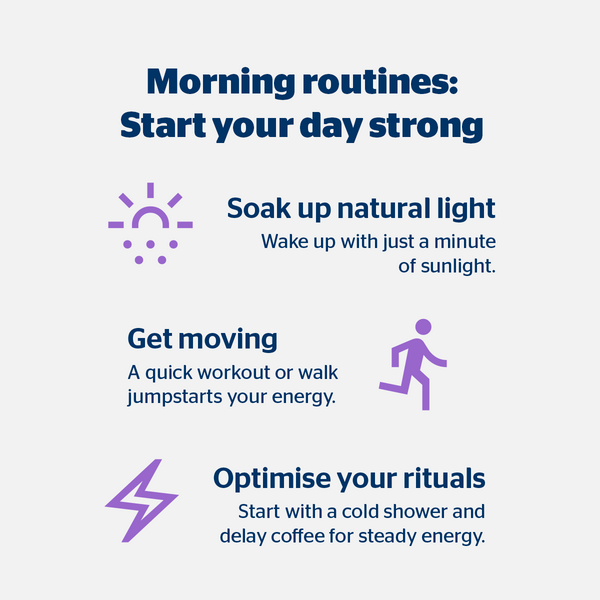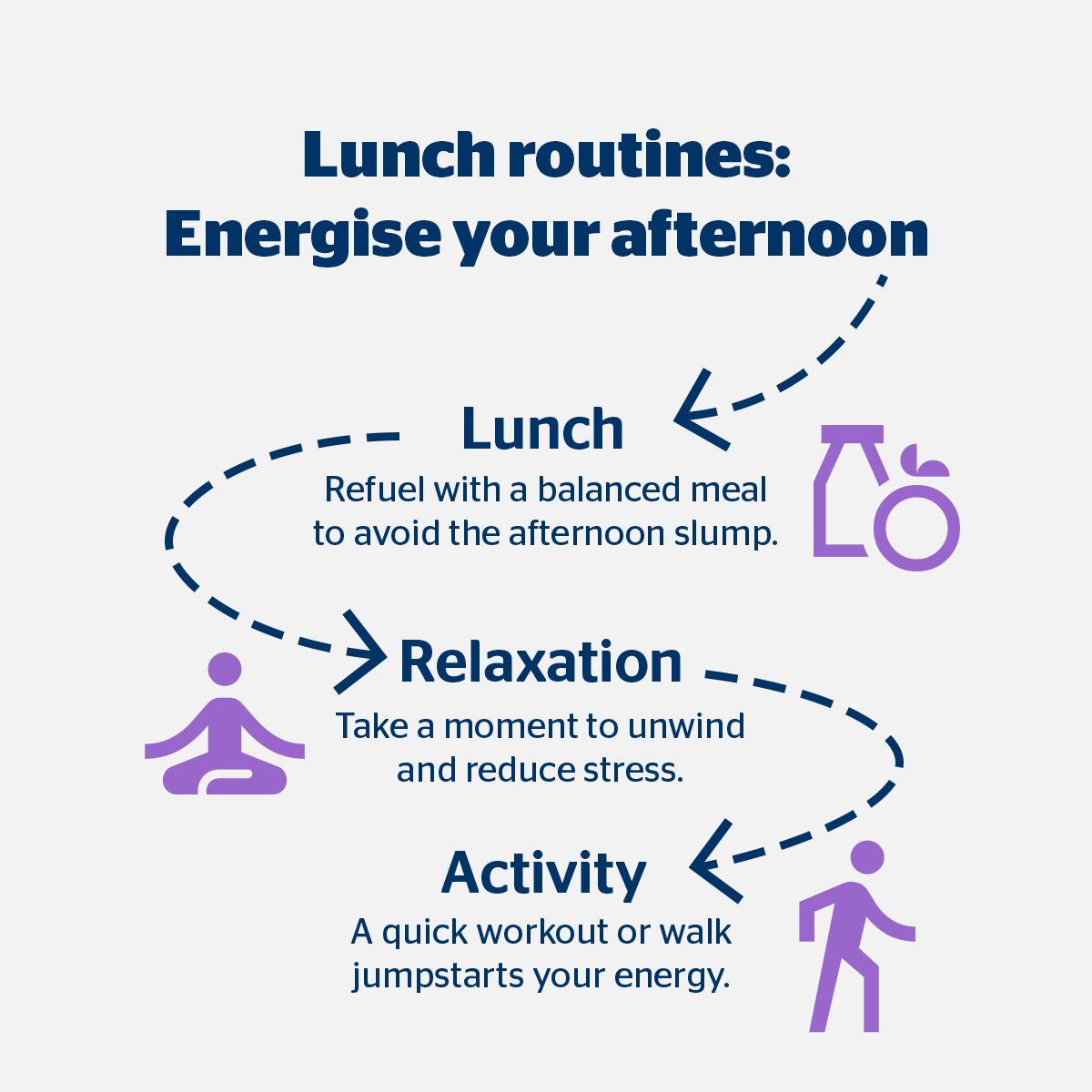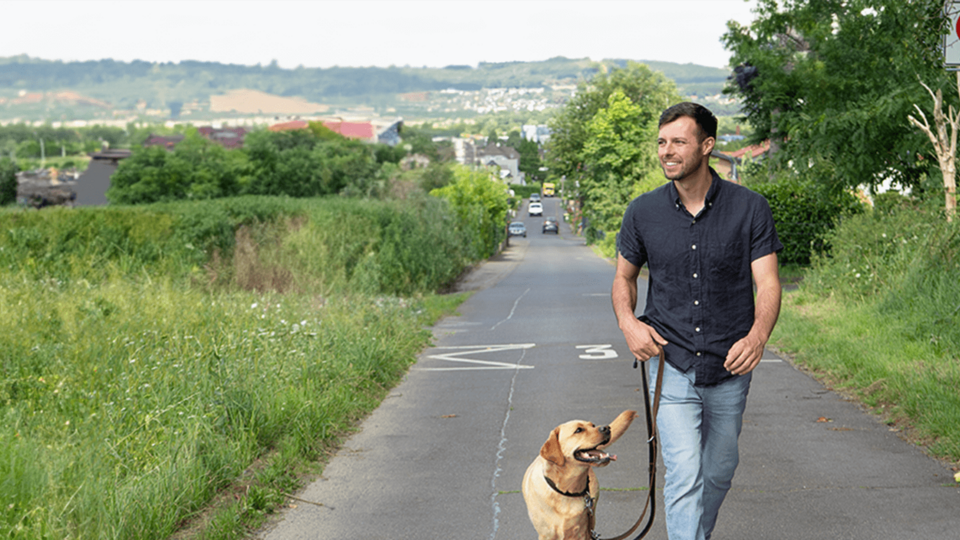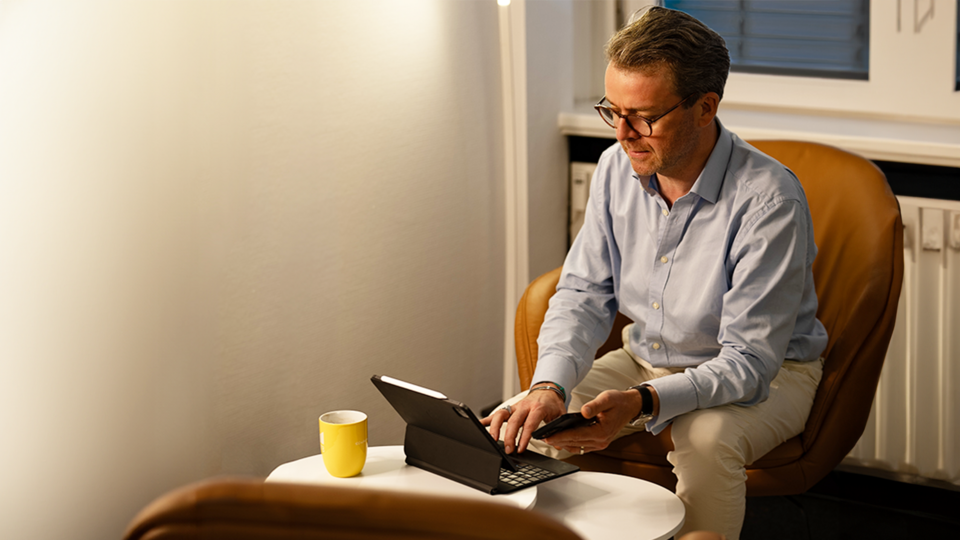Good habits: How to use and implement productive routines
|

reading time: ca. 5 minutes
- If you want to be productive and successful, you can't avoid good routines. The right habits not only improve performance, but also health and well-being.
- It makes sense to divide your day into three phases. The perfect morning routine ensures a powerful start into the day, the right lunchtime routine maintains energy levels. A relaxed evening routine improves your sleep.
- Our expert Krystian Kwasniewski shows you the best way to organise your morning, lunch, and evening routine. To help you stick to your new habits, for example, it is helpful to have fixed daily plans.
- Small tricks can also help you overcome obstacles such as decreasing motivation or a lack of time. Also, you should not start with too high expectations towards yourself.
Many successful people have routines – and seem to be productive and full of energy all day long. Healthy routines are a real game changer. A few simple but effective habits have a huge impact on our well-being and performance. Our expert Krystian reveals the best routines and provides tips on how to implement them successfully.
Routines not only ensure an organised and structured everyday life; when used correctly, they also improve productivity, health, and satisfaction. Most successful people use routines to organise their day more efficiently.
Good morning, lunch, and evening routines, which are made up of several small habits, are particularly important. Unfortunately, it is not always easy to introduce new routines and stick to them. That's why we spoke to Executive Performance Coach Krystian Kwasniewski. Not only does he know the best routines but also sensible strategies for staying consistent.
Krystian's tips for your morning routine
- Soak up natural light: Exposure to natural light supports your body's functions and boosts alertness. Even if it's just a few minutes, it's worth it.
- Get moving: A little exercise, for example a quick workout or walk in fresh air, can help kickstart your body. It’s also and especially recommended for morning grouches!
- Optimise your rituals: Delay your first coffee a little. Instead, take a cold shower, even if it requires some effort – this provides a real energy boost.

Krystian recommends three sections for your lunch break:
- Lunch: Make sure you have a balanced meal. This will prevent the afternoon slump and give your body fresh energy.
- Relaxation: Take some time for a proper break. Meditating, listening to music, switching on a podcast or simply doing nothing at all: this will help you reduce stress and start the afternoon feeling refreshed.
- Activity: To revitalise your body and mind, use your break to get some movement in. Some light exercises, or even just taking a walk, will help you unwind. This is particularly important if you’re sitting at your desk all day.

In the evening, you should rest and slowly prepare your body for the night. This will not only enable you to sleep well, but you will also wake up the next day refreshed and full of energy.
The evening routine is crucial for your well-being and performance on the following day and should therefore not be neglected.
Krystian's tips for your evening routine
- Reduce sensory input: Lower the volume and light – or avoid screens completely. Instead of watching TV, for example, you can switch to calming activities such as reading.
- Engage in low-attention activities: To help your body and mind wind down, don't engage in activities that require high levels of attention or energy in the evening.
- Start a journal: Start a journal in which you write down your thoughts. To get started, ask yourself: what went well today? What didn't? What can I do better tomorrow? You can also use the journal in the morning, for example for your daily goals.

Productive mini-routines in everyday working life
You can also incorporate small routines throughout the working day that will benefit you. These could be the following, for example:
- Small movement sessions or stretching exercises
- Working while standing or walking in between
- Drinking a large glass of water
- Taking micro-breaks
- Short mindfulness exercises or meditation
- Healthy snacks
Introducing good routines: Here's how
Introducing healthy habits and then sticking to them in the long term can be tough, but it's worth it.
Krystian revealed four important tips to help you get started:
- Get started with short routines: First, start with smaller routines that only cost a few minutes. Even these mini habits can boost your energy and productivity.
- Incorporate movement: One or more small movement sessions a day are among the most important routines. Natural full-body actions such as running, jumping, and walking are particularly valuable.
- Follow a consistent schedule: Decide on a few daily routines and stick to them by repeating the habits every day. A fixed daily structure improves focus and stress resilience.
- Respect your natural rhythm: Segment your day into three phases aligned with your body's natural biorhythm. Plan a healthy morning, lunch, and evening routine.
Good routines for more success at work
From Steve Jobs to Barack Obama and Jeff Bezos – many successful people show how routines as a fixed part of the daily schedule can drive a career forward. More productivity, creativity and energy help you achieve your goals.
Just a few minutes a day can have a positive impact. Choose the routines that make the most sense for you and give them a try!









